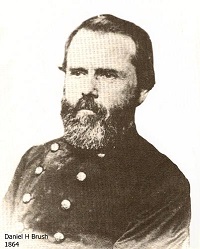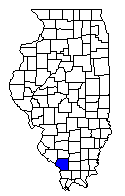
 Every town or city of consequence which is not the sudden and recent
product of trade conditions venerates the memory of some sterling, though it
may be rugged, founder who, anticipating the tide of immigration which has
flowed from the Atlantic seaboard steadily toward the sunset until it has
overspread the whole country, planted his foot in the wilderness and there
hewed out for himself a new home wherein his hopes might expand and
flourish. These were men of heroic mold, fashioned by their time for sturdy
work fit progenitors of the people they begot. No toil deterred, no danger
daunted, no hardship dismayed them. With unyielding will they pressed their
way over every obstacle, often challenging Fate herself into the lists, and
meeting her on almost equal terms.
Every town or city of consequence which is not the sudden and recent
product of trade conditions venerates the memory of some sterling, though it
may be rugged, founder who, anticipating the tide of immigration which has
flowed from the Atlantic seaboard steadily toward the sunset until it has
overspread the whole country, planted his foot in the wilderness and there
hewed out for himself a new home wherein his hopes might expand and
flourish. These were men of heroic mold, fashioned by their time for sturdy
work fit progenitors of the people they begot. No toil deterred, no danger
daunted, no hardship dismayed them. With unyielding will they pressed their
way over every obstacle, often challenging Fate herself into the lists, and
meeting her on almost equal terms.
The dreams that impelled them to
and sustained them in their perilous undertakings we may not know, for they
have left no record of them. Perhaps they were inspired only by hope of
immediate gain, and saw no farther. It may be that some of them sought
naught but relief from the irksome restraints of society in the wild life of
the forest. Yet men of either of these classes must have awakened to wider
vision in their close communion with Nature, and come to see themselves, as
many others must have seen them, the planters of new communities, the
patriarchs of people, to pass away in their time but to be revered ever
afterward, and, remote from the period when their wasted tenements were laid
to rest, to be kept standing in the gaze of posterity, heroic figures, dimly
glorious, far up the valley of years. To this class belongs General Daniel
H. Brush, the founder of Carbondale. He had both the lessons of the past and
the impressive events of what was the present to him to give him hints of
what might happen anywhere in this country. But he had also a wide sweep of
vision and foresight, and it must have revealed to him much for what he was
preparing the way, extravagant as his view might have looked to others.
General Brush was born at Vergennes, Vermont, in 1813, and in 1820 moved
with his parents to Illinois. In 1836 he married Miss Julia Etherton, of
Jackson county, and in 1852 they moved into the county from their former
home and took up their new residence in a small settlement which had not
then a name, but which subsequently, through his enterprise, became
Carbondale and received its geographical baptism from him. He and ten other
men acquired the land on which the city now stands, and, after due
deliberation, determined to lay out a town on it.
Being a strong
temperance man, Mr. Brush, for he was not then a general, had incorporated
in each contract for the sale of a town lot a provision forbidding the
traffic in intoxicating liquors as a condition of the sale. He also looked
after the moral and religious welfare of the town in another important
respect, by making provision for four churches and setting aside a lot for
each of them when he laid out the village he was starting as the nucleus of
the city he hoped would follow.
In 1856 he was chosen trustee and a
member of the building committee for the erection of a Presbyterian church.
The facilities for building were meager and the structure was not completed
until 1859, but it was dedicated on July 12 of that year. On December 18,
following, he was elected ruling elder of the congregation. Thus was started
in motion the beneficent force that has resulted in the present large
congregation of the Presbyterian sect in the city and the splendid church
edifice which it uses.
Up to this time his work in connection with
his bantling was one of peace and progress only. But the time was near at
hand when he would be called to sterner duties and take the flower of the
community with him. When the Civil war began the whole of his following was
against the partition of the Union, and he raised a company of volunteers in
and around Carbondale to assist in defending it against this disaster. This
became Company K, Eighteenth Illinois Volunteer Infantry, and he was chosen
captain of it by the united voice of its members.
The command was
soon at the front and engaged in active hostilities, although it was formed
in response to the first call of President Lincoln for volunteers. At the
battle of Fort Donelson in 1862, Captain Brush received a rather serious
wound which disabled him for service for a time. On his recovery and return
to the company he was promoted major for his bravery in the engagement. At
the battle of Shiloh he commanded the regiment and received another wound.
He recovered from this, however, in time to take part in the battle of
Little Rock, Arkansas. In 1863 he resigned from the army, and was discharged
with the rank of brevet brigadier general.
When he left the military
service he returned to Carbondale, and thereafter served Jackson county for
a number of years as county and circuit clerk. In 1867 his wife died, and in
1868 he married a second time, being united in New York on this occasion
with Miss Elizabeth Ward, a Carbondale lady, with whom he lived in domestic
happiness until 1879, when he was killed by a falling tree in the yard of
his home. General Brush did more for Carbondale than any other one man. He
was a merchant and helped to give the town mercantile importance. He also
dealt extensively in land, and in this way aided greatly in developing and
improving the surrounding country. He was an earnest advocate of everything
that was good and was universally beloved.
Extracted 11 Nov 2018 by Norma Hass from 1912 A History of Southern Illinois, by George W. Smith, volume 3, pages 1398-1399.
Randolph |
Perry | Franklin |
Perry MO |
 |
Williamson |
| Union |


